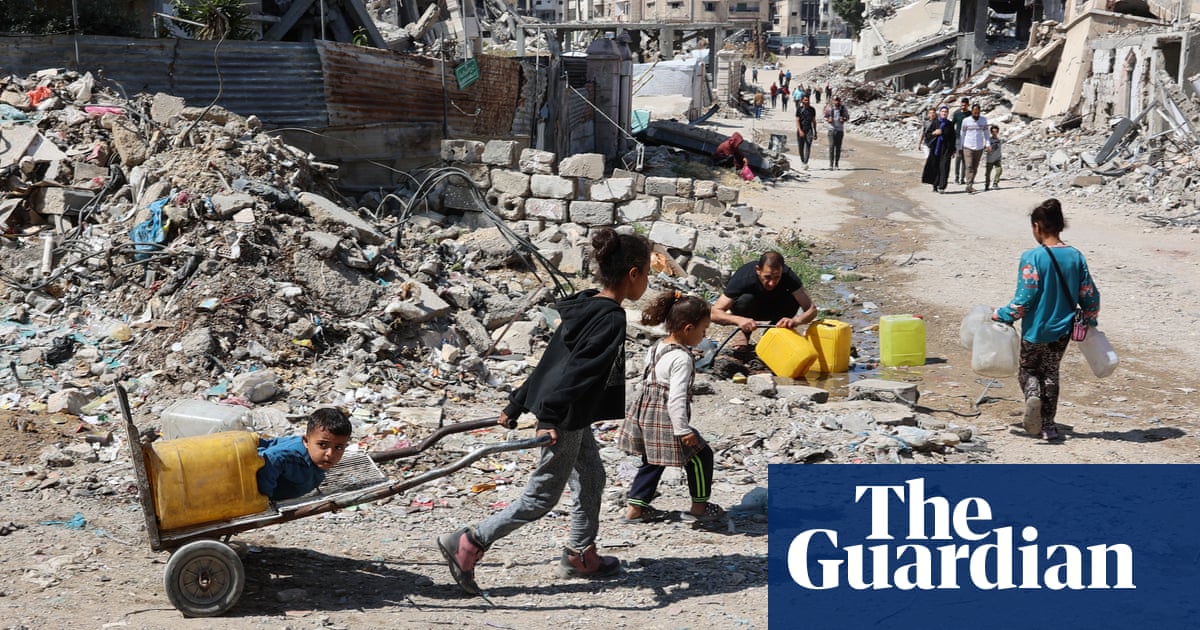The former EU foreign policy chief Josep Borrell has launched a blistering attack onIsrael, accusing its government of committing genocide in Gaza and “carrying out the largest ethnic-cleansing operation since the end of the second world war in order to create a splendid holiday destination”.
Borrell, a former Spanish foreign ministerwho served as the EU’s top diplomat from 2019 to 2024, and president of the European parliament from 2004 to 2007, also criticised the bloc’s failure to use all the means at its disposal to influence Israel, saying expressions of regret were simply not enough.
As he collected the Charles V European award in front of dignitaries including King Felipe in south-west Spain on Friday, Borrell said the horrors Israel had suffered in the Hamas attacks on 7 October 2023 could not justify the horrors it had subsequently inflicted on Gaza.
“We’re facing the largest ethnic cleansing operation since the end of the second world war in order to create a splendid holiday destination once all the millions of tonnes of rubble have been cleared fromGazaand the Palestinians have died or gone away,” he said in a characteristically direct speech.
The former diplomat accused Israel of violating all the rules of conflict and of using the starvation of Gaza’s civilian population as a “weapon of war”.
“Three times more explosive power has been dropped on Gaza than was used in the Hiroshima bomb,” he said. “And for months now, nothing has been getting into Gaza. Nothing: no water, no food, no electricity, no fuel, no medical services. That’s what [Benjamin] Netanyau’s ministers have said and it’s what they’ve done.”
He added: “We all know what’s going on there, and we’ve all heardthe objectives stated by Netanyau’s ministers, which are clear declarations of genocidal intent. Seldom have I heard the leader of a state so clearly outline a plan that fits the legal definition of genocide.”
Borrell went on to take Europe to task for shirking its moral and humanitarian responsibilities over Gaza.
“Europe has the capacity and the means not only to protest against what is going on but also to influence [Israel’s] conduct,” he said. “But it is not doing so. We supply half the bombs that are falling on Gaza. If we really believe that too many people are dying, then the natural response would be to supply fewer weapons and to use the lever of the association agreement to demand that international humanitarian law is respected, instead of just lamenting that that isn’t happening.”
The veteran socialist politician also used his speech to reflect on current geopolitical realities, which he described as unprecedented. The post-1945 world order, he said, was being demolished by Vladimir Putin, “a tyrant whose military failure in Ukraine has made him more dangerous”, and by Donald Trump who he described as “the master of chaos, who has gone from being an ally to an adversary”.
The question facing Europe, he added, was how well it would cope without the protections long afforded by its old ally across the Atlantic.
Sign up toThis is Europe
The most pressing stories and debates for Europeans – from identity to economics to the environment
after newsletter promotion
“In order to deal with this situation, we need to move from structural pacifism to strong rearmament, but we need to do that on a European scale if we want to avoid the waste that stirs the old national demons,” said Borrell. “We need to shift away from a comfortable and atavistic Atlanticism, which has seen us delegate our security to the US, to building full European sovereignty, which will also mean giving Europe a fiscal and security dimension.”
He said that Europe was no longer the great driver, or chronicler, of world history.
“Today, history has become a product that’s imported,” Borrell added. “History has been written by the Russian soldiers who marched towards Kyiv in the early hours of a February morning, and by the Ukrainians who resisted. History is being written by the US voters who put Mr Trump back in the White House.”
History, he went on, was now the story of the technological competition between the US and China. In what appeared to be a swipe at Trump, Borrell added: “The faces of history today are those of Donald Trump, Vladimir Putin and Xi Jinping. None of them is European. I know them – well, I know them a bit – and I can assure you that of those three, two are more intelligent than the third. The thing is the third one doesn’t know it.”
